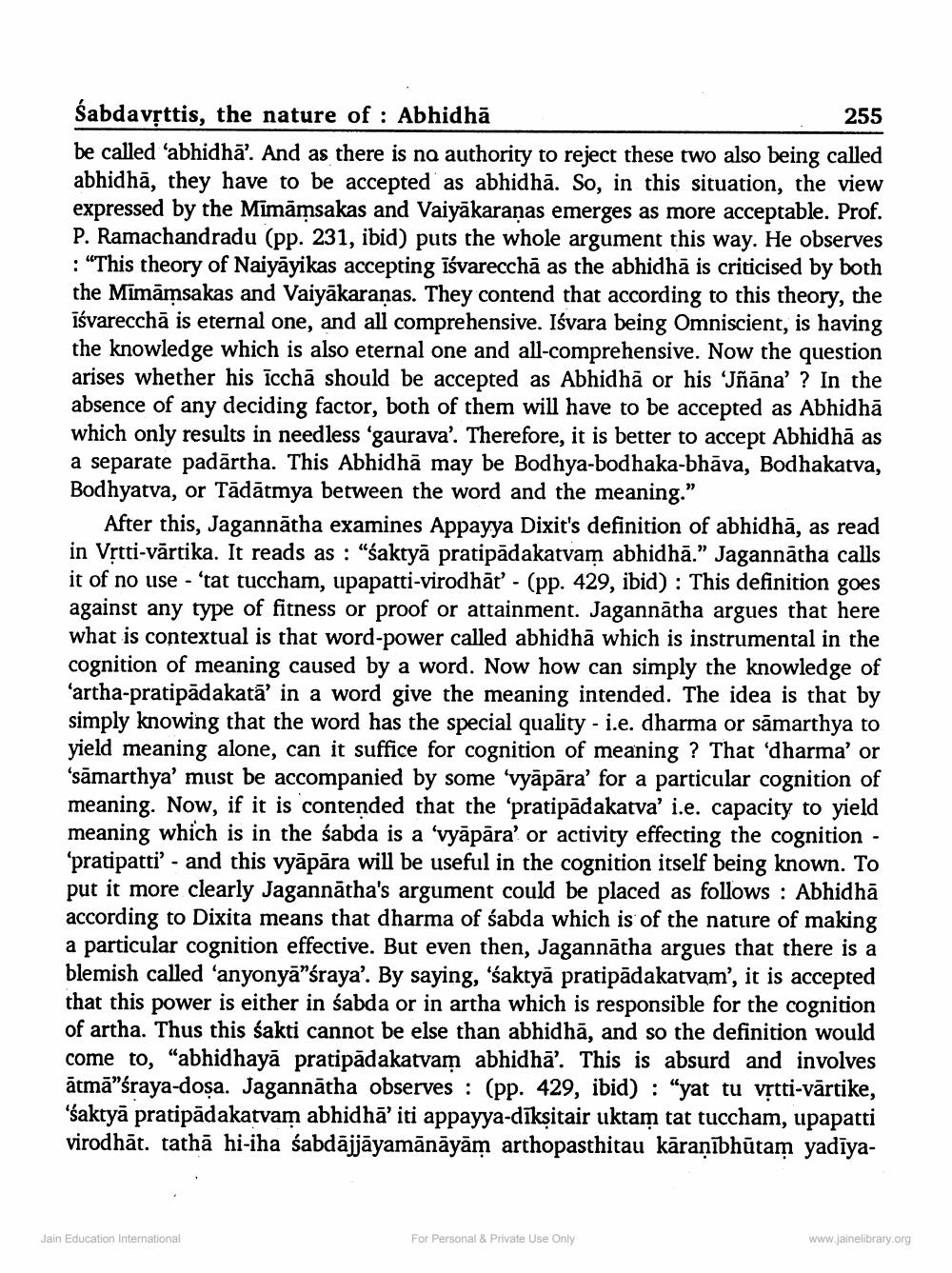________________
Śabdavșttis, the nature of : Abhidhā
255 be called 'abhidhā'. And as there is no authority to reject these two also being called abhidhā, they have to be accepted as abhidhā. So, in this situation, the view expressed by the Mimāmsakas and Vaiyākaranas emerges as more acceptable. Prof. P. Ramachandradu (pp. 231, ibid) puts the whole argument this way. He observes : "This theory of Naiyāyikas accepting iśvarecchā as the abhidhā is criticised by both the Mimāmsakas and Vaiyākaranas. They contend that according to this theory, the īśvarecchā is eternal one, and all comprehensive. Iśvara being Omniscient, is having the knowledge which is also eternal one and all-comprehensive. Now the question arises whether his iccha should be accepted as Abhidhā or his Jñāna'? In the absence of any deciding factor, both of them will have to be accepted as Abhidhā which only results in needless 'gaurava'. Therefore, it is better to accept Abhidhā as a separate padārtha. This Abhidhā may be Bodhya-bodhaka-bhāva, Bodhakatva, Bodhyatva, or Tādātmya between the word and the meaning."
After this, Jagannātha examines Appayya Dixit's definition of abhidhā, as read in Vrtti-vārtika. It reads as : "śaktyā pratipadakatvam abhidhā.” Jagannatha calls it of no use - 'tat tuccham, upapatti-virodhāt' - (pp. 429, ibid): This definition goes against any type of fitness or proof or attainment. Jagannātha argues that here what is contextual is that word-power called abhidhā which is instrumental in the cognition of meaning caused by a word. Now how can simply the knowledge of 'artha-pratipadakatā' in a word give the meaning intended. The idea is that by simply knowing that the word has the special quality - i.e. dharma or sāmarthya to yield meaning alone, can it suffice for cognition of meaning ? That 'dharma' or 'sāmarthya' must be accompanied by some 'vyāpāra' for a particular cognition of meaning. Now, if it is contended that the 'pratipādakatva' i.e. capacity to yield meaning which is in the sabda is a 'vyāpāra' or activity effecting the cognition - 'pratipatti' - and this vyāpāra will be useful in the cognition itself being known. To put it more clearly Jagannātha's argument could be placed as follows : Abhidhā according to Dixita means that dharma of śabda which is of the nature of making a particular cognition effective. But even then, Jagannātha argues that there is a blemish called “anyonyā”śraya'. By saying, 'śaktyā pratipādakatvam', it is accepted that this power is either in sabda or in artha which is responsible for the cognition of artha. Thus this sakti cannot be else than abhidhā, and so the definition would come to, "abhidhayā pratipadakatvam abhidhä'. This is absurd and involves ātmā"śraya-dosa. Jagannātha observes : (pp. 429, ibid) : "yat tu yrtti-vā 'śaktyā pratipādakatvam abhidhā' iti appayya-dīkṣitair uktam tat tuccham, upapatti virodhāt. tathā hi-iha sabdājjāyamānāyām arthopasthitau kāranībhūtam yadiya
Jain Education International
For Personal & Private Use Only
www.jainelibrary.org




